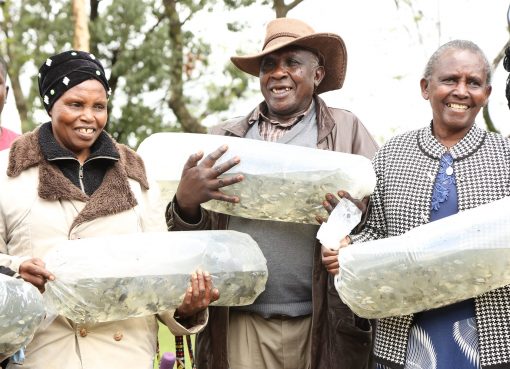A group of youth in Kwale County has teamed up to address the problem of shortage of food that has constantly hit the coastal county.
The group, which comprises over 20 youths, has started a program dubbed ‘elimu shamba’ to train local farmers on modern farming methods to fight perennial hunger.
Farmers in the county are still subscribing to traditional techniques of farming, a factor that has been blamed for the perennial food shortages over the years.
Speaking to KNA, Elimu Shamba Program Coordinator, Omar Jundani said the initiative by the young university graduates is to make the county food secure.
Jundani added that the region receives insufficient rainfall that cannot support maize crop farming hence the need to agitate for a change.
“We must educate our people on proper farming. Climate change has affected our county and the rains we receive are insufficient. We must change the culture of maize crop farming and adopt another culture. We must find an alternative option for our community,” he said.
According to the youth-led group, the region has fertile soil that could support sorghum, peas and green beans that are drought resistant.
Jundani said if relevant authorities in the field of agriculture could have been educating the locals on proper farming then the county could have been secure during droughty seasons.
“Every year the county reports cases of malnutrition and this is attributed to poor farming techniques. It’s time we change that for the better,” he said during an interview in Kwale town.
The program coordinator said the youth initiative seeks to inculcate among local farmers on the need to take agriculture like any other business venture.
Jundani said Kwale County has fertile soil that can support carrots, sukuma wiki, onions, avocados, pineapples, and many commercial crops. He said that commercial farming can reduce poverty levels in the county.
The program coordinator noted that farmers in the county do not have access to modern food storage systems. He said the traditional granaries do not offer protection to seeds and grains resulting in losses.
“The traditional granaries have been turned into feedlots for weevils. We encourage and educate our people on the use of modern technology such as improved storage sacks,” ‘Jundani said.
He said the Elimu shamba program will enlighten the farmers on important steps in farming such as soil preparation, spacing, and use of fertilizers to increase their productivity.
Junadani lamented that many of the local farmers in the county are not familiar with key farming techniques such as soil preparation, crop spacing, and seeds selection.
He said the education seminars will be held across Kinango, Msambweni, Matuga, and Lunga- Lunga sub counties where close to 20 farmers from each ward will be engaged.
He said the farmers will be taken through a series of demonstrations from experts in different agricultural sectors.
Junadani said the youth-led initiative believes that a changed perspective on farming will eventually make residents of Kwale County self-reliant and be able to grow the economy of the county which is heavily affected by the problem of food shortage.
By Raymond Zaka and Hussein Abdullahi





